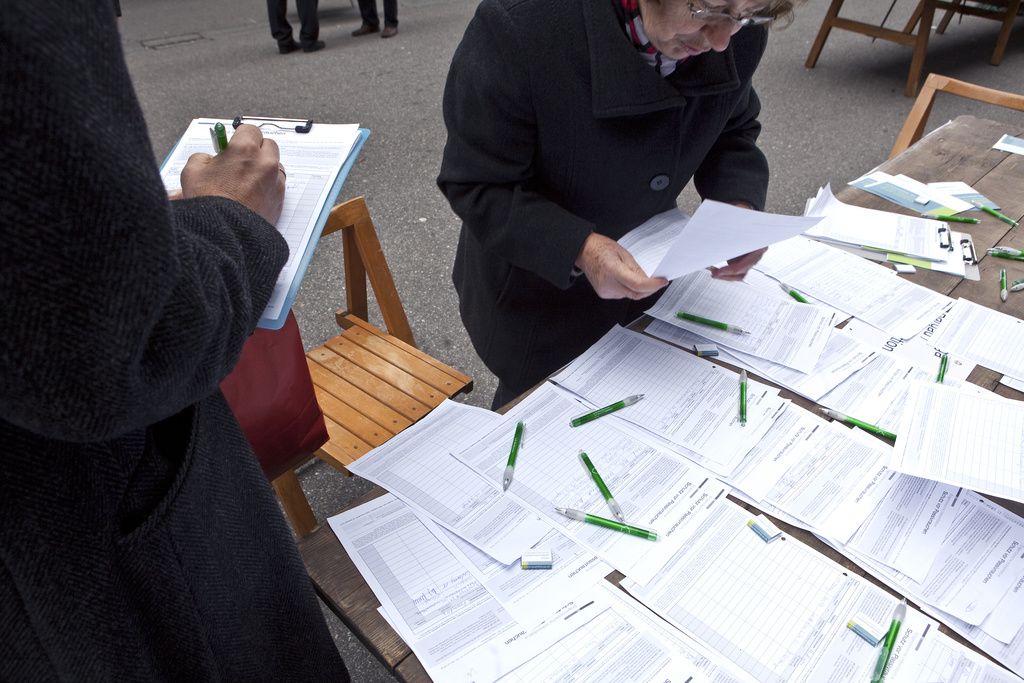Can direct democracy be bought?

In a country where people’s initiatives play a central political role, the issue of paying professionals to collect petition signatures is still a taboo.
“Need a certain number of signatures? We’ll carry out a test run to see whether we can deliver these by a set date. You pay only if we succeed.”
That is from the website of Büro für Politisches (political issues office), a public relations agency in Bern, which for SFr1-2 ($1.10-2.20) per signature will send its young autograph hunters onto the streets to solicit the names and addresses of passers-by on a range of issues.
In Switzerland, if an individual or group can collect 100,000 valid signatures within 18 months in favour of a proposal – for example banning the construction of minarets, as in 2009 – they can force a nationwide vote to amend the constitution (see box).
The fact that few such initiatives succeed ignores the increasing influence they have on the political agenda. Over the past 40 years, around half of the initiatives launched have made it to the ballot box, of which just 11 out of 121 have been accepted.
Challenging
In practice, however, gathering 100,000 signatures is both time-consuming and expensive, even for the main political parties. It has been estimated that getting an initiative to the ballot costs requires 5,500 hours of work and can cost up to SFr500,000.
As a result, parties try to gather as many signatures as possible themselves, but when time gets tight or they can’t make any progress, an agency is enlisted to help.
The Social Democrats, the Greens, the Radicals and the Swiss People’s Party have all turned to the pros (see box) – but although it’s completely legal, getting politicians to talk about it is almost as hard as collecting the signatures.
“Most clients are afraid their initiative will look bad if it becomes known that collectors are paid,” Lukas Harder, a professional signature collector from the Büro für Politisches, told swissinfo.ch.
“[Politicians] still like to push the view that we have the best democracy in the world and if they admit to buying signatures, they wouldn’t be able to say that anymore.”
Not a problem
Andreas Auer, professor of constitutional law at Zurich University and director of the Aarau-based Centre for Democracy, denies this is a problem for direct democracy.
“Directly buying votes is a criminal offence. If I offer somebody money for voting for X or against proposition Z, I am liable. But buying votes in the sense that signature collecting is paid is not the same and does not pose a problem for direct or representative democracy,” he told swissinfo.ch.
“People are usually not aware that the person collecting signatures gets paid, and if they are, it doesn’t affect their liberty to sign or not to sign.”
Many people like to think direct democracy is above money: money can buy a lot in the world, but surely not democracy. But are they being naive? Can Swiss direct democracy be bought?
“Money might well play a role, but that role is rarely decisive,” Auer said.
“But who is ever going to prove that money has made the difference? Don’t underestimate the soundness of people. If they realise somebody is trying to buy a result with loads of money, the effect will most likely be the opposite…”
Buying in bulk
Politicians don’t have a monopoly on paying for signatures, however. Discount retailer Denner, Switzerland’s third-largest supermarket after Migros and Coop, brought the issue to national prominence when it admitted buying signatures in bulk for two initiatives in 1997.
It had paid 300 people for collecting 250,000 signatures within a few weeks. Both initiatives were later rejected by voters, but the debate had started.
Two years later the Swiss Trade Union Federation admitted paying SFr1.50 per signature for an initiative.
These developments caught parliament’s attention. Concerned by the “buyability of direct democracy”, in 2001 a Senate commission drafted a motion calling on the cabinet to check “whether paying people to collect signatures should be made punishable for the government and cantons”.
But the cabinet didn’t share these concerns. “Banning the payment of signature collectors would be a restriction of the law on initiatives and referendums and an interference in the exercise of citizens’ rights,” it said in its report.
“A prohibition could hardly be enforced,” Auer added. “What about a union employee or party secretary collecting signatures without being paid directly, but taking his working hours for doing it?”
Political convictions
Harder explained that most collectors are young – between 20 and 25 – but their targets are of all ages.
“You try to concentrate on the people who are not so political,” he said. “That might sound contradictory, but that’s how it works best on the street. In Switzerland there are still so many people who are not interested and just sign anything that you’d just lose time trying to convince people.”
The rate of signatures depends on the topic, the weather and the location – “if it’s crowded or somewhere where people just want to do their shopping it’s much worse than in a park, but maybe between ten and 25 signatures an hour”.
And does he take all jobs? “Definitely not. I’m also a candidate for the House of Representatives [as an Independent in next month’s elections]. I have my political opinions and I can’t do something that I’m against. So there have been some things where I said, no sorry, that’s not for me.”
Voting is central to the Swiss way of life. Any Swiss citizen can put forward a proposal to amend the constitution, but getting it to the ballot box is a glacial process.
If the citizen can collect and hand in to the Federal Chancellery at least 100,000 signatures in favour of the amendment within 18 months, this people’s initiative must be put to a nationwide vote.
The cabinet then discusses the initiative and within one year must agree on a united position and a detailed message to present to parliament on the issue. Parliament then discusses the initiative and recommends to the people and to the cantons whether it should be adopted or rejected.
A people’s initiative needs a majority of the popular vote as well as the backing of a majority of the country’s 26 cantons to become law.
Laws which have been passed by parliament can be challenged by the public in a referendum, for which at least 50,000 signatures must be gathered within 100 days of the publication of a decree. Unlike a people’s initiative, a referendum needs only a majority of popular votes.
Andreas Käsermann, a spokesman for the centre-left Social Democrats, confirmed they had employed an agency to collect signatures for their clean-tech initiative – successfully handed in early this month – but insisted they had collected most of the signatures themselves.
It was normal, he said, towards the end of a campaign to pay for the collection of signatures.
A few weeks ago the Green Party faction of canton Basel Country used professionals to get signatures for its initiative “for a sustainable and resource-efficient economy”.
But this didn’t go down well with the mother party. “Paying for signatures isn’t a strategy of the Greens,” said general secretary Miriam Behrens. “How am I expected to motivate Greens to collect for free, if a few people are being paid to do it?”
Silvia Bär, general secretary for the rightwing Swiss People’s Party, also admitted to having paid “individuals” to collect signatures “in exceptional cases” but had no further comment.
The situation was similar for the centre-right Radical Party. “We resort to a handful of paid collectors on a very limited scale,” said spokesman Noé Blancpain.
“The Radicals have neither the intention nor the money to pay for signatures in large amounts.”
The centre-right Christian Democrats and Green Liberals said they didn’t have the money to spend on signatures.
(Source: Swiss News Agency)

In compliance with the JTI standards
More: SWI swissinfo.ch certified by the Journalism Trust Initiative





You can find an overview of ongoing debates with our journalists here. Please join us!
If you want to start a conversation about a topic raised in this article or want to report factual errors, email us at english@swissinfo.ch.